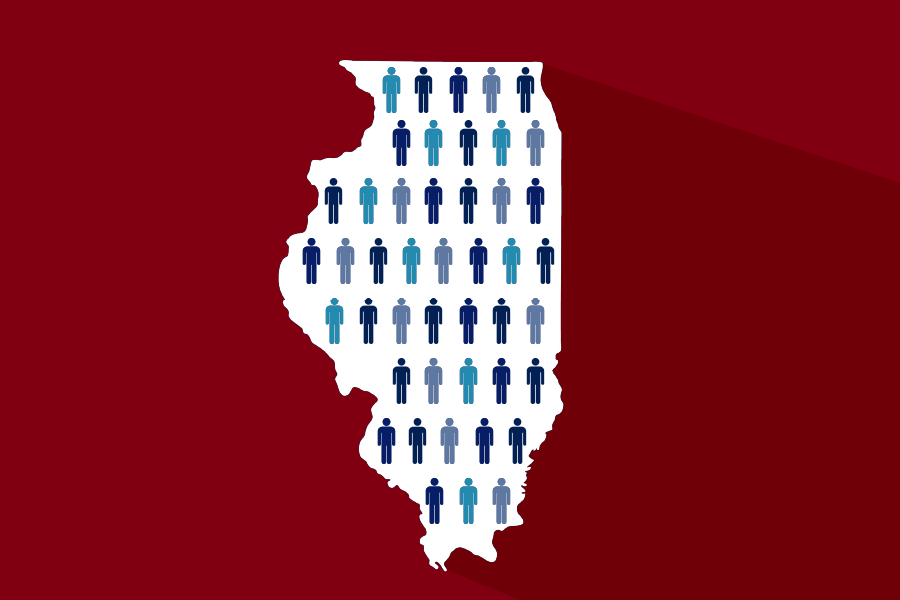Shifted census response deadline causes difficulties reaching hard-to-count communities
Graphic by Catherine Buchaniec
With less than a week left until the census response deadline, several census tracts in Evanston risk undercount.
September 24, 2020
With less than a week to go until the Sept. 30 census response deadline, five Evanston census tracts remain below their 2010 census response rate and risk being undercounted, according to Sarah Flax, the city’s housing and grants manager.
Earlier this year, the Census Bureau extended the deadline to the end of October after COVID-19 restricted in-person counting operations. The agency reversed course in August, announcing they would shorten the data collection period to end on September 30 to ensure data processing and apportionment counts are completed by the end of the year.
The new deadline means communities across the country have less time to get as much of their population counted as they can, which can present problems, especially for hard-to-count populations. The census form can be filled out online, over the phone or in person with a census worker. Flax said Evanston’s response rate is doing well overall. As of Sept. 24, the city’s self-response rate was at 75.3 percent, which exceeds 2010 numbers by 2.5 percentage points.
However, Flax said five census tracts are behind, including tracts in the 1st, 4th, 5th, 6th and 7th wards. Flax said Northwestern students have been a difficult population to account for because some students who would be living in off-campus apartments are now living at home. Other hard-to-count populations include low-income populations, non-English speakers and minority communities, according to the Center for Civic Engagement.
Flax said the city is working hard to get as many people counted as possible in the time left, but because of the pandemic, outreach has been difficult. With restrictions on social gatherings, the city hasn’t been able to spread the word in person by going to public spaces, including faith-based centers like churches.
“You can send out tweets and messages, but the most successful thing is when somebody they trust talks to them face to face and says this is why it matters,” Flax said. “That’s what most of us respond to, and the less time there is for that, the fewer people we’re actually going to be able to reach.”
Since the census determines political representation and funding, a census undercount can have serious consequences. In Evanston, Flax said census data is also used to draw ward boundaries.
Yoselyn Ovalle, the associate manager of the Democracy Initiative at Forefront, a statewide organization working to build a social impact sector, said more time is needed to make sure undercounted communities are counted. Currently, some census tract response rates in predominantly Black and brown communities in Chicago are as low as 30 to 40 percent.
“As a country, the pandemic has hit us greatly, and specifically the pandemic has hit these hard-to-count communities, these historically underfunded communities, the most,” Ovalle said. “We just need more time so that we can get these folks counted. It’s so important because it really determines the next decade.”
Ovalle said the census is about knowing where people are living so that they can get adequate funding, resources and political representation.
When a community doesn’t have adequate funding for programs like healthcare, education and infrastructure, its members have to spend their own money to access those services, which disproportionately impacts communities of color where “financial hardships are more pronounced,” Kareem Butler, the director of learning and evaluation at the Chicago Urban League, said.
Butler, who has been working to increase census participation in African American communities, said the deadline shift blindsided many people involved in census work. He said while the Census Bureau is trying to ensure communities get counted, institutional barriers continue to prevent certain communities from being accurately counted, while others with more resources are overcounted.
“The census isn’t a solution to all of these problems but it helps provide people with sort of a baseline,” Butler said. “You need a starting point because communities of color, especially the African American community have been really kept out of this process.”
Email: delaneynelson2023@u.northwestern.edu
Twitter: @delaneygnelson
Related Stories:
— Hard to Count: Evanston Census enumerator recruitment intensifies during COVID-19
— Butler Residence and Express Service named new African American heritage site



